Katja Wezel of the History Department and Steve Lund of the ESC will present an overview of the DAAD family of resources and scholarships, then focus specifically on the graduate level Study Scholarship (that supports graduate study in Germany) and Research Awards (which support post-baccalaureate research in Germany). Contact Steve Lund at slund@pitt.edu if you have any questions.
Monday, September 12th, 2016
Thursday, August 4th, 2016
Dr. Musialkowska and Dr. Talaga, the 2016 ESC and ULS Summer Research Scholars, will be presenting an update on their research in Pitt’s Barbara Sloan EU Depository Collection. Dr. Musialkowska’s research focuses on EU-Latin America dialogue on territorially-oriented development policies. Dr. Talaga’s research focuses on the evolution of legal character of decisions on state aid in the European Union. Both of this year’s summer scholars have come to Pitt from Poznan University in Poland. The Summer Research Scholars Program is a joint initiative by the ESC and the University Library System to award travel grants to two scholars per year working on topics relevant to European integration and for whom access to the unique archival collections housed at the University of Pittsburgh would prove beneficial. Dr. Musialkowska and Dr. Talaga were selected as Summer Research Scholars for a four week visit to Pitt and this session provides staff, faculty, and students with an opportunity to see how their research is progressing to date.
Monday, August 1st, 2016 to Friday, August 5th, 2016
K-12 French Teachers participated in a week-long language pedagogy program at the University of Pittsburgh campus. Exploring the theme of "La France, La Francophonie, et la 'clash' des civilisations" during morning sessions, teachers also developed Integrated Performance Assessments (IPAs) in afternoon sessions to improve assessment and instruction in the classroom.
Thursday, July 14th, 2016
On June 23rd, voters in the UK went to the polls and voted by a slim margin to leave the EU. The political and economic repercussions were immediate. When will the dust settle? And what will Europe - and the UK - look like when it does?
Log in from your home or office to get expert analysis of the vote and its implications for Europe and the U.S.
Presenters:
Dr. Jae-Jae Spoon, Associate Professor of Political Science, University of Pittsburgh
Dr. Tim Oliver, Dahrendorf Fellow on Europe-North America Relations, London School of Economics
Dr. Sean Ehrlich, Associate Professor of Political Science, Florida State University
Tuesday, June 14th, 2016
Angelo Golia, a doctoral candidate at the University of Naples II in Italy, will speak on the subject of “Transnational Enterprises from a Constitutional Law Perspective.” Angelo is writing his PhD dissertation on “The Responsibility of Transnational Enterprises for Human Rights Violations: A Comparative Perspective.” He received his master’s degree in law from the University of Naples II in 2013. He has been a stagiaire at the Institute des Hautes Etudes sur la Justice in Paris, France, and is a member of the Clinique Doctorale de droit international des droits in Aix-en-Provence ,France. He will be in residence with CILE from February 2016 through June 2016.
Please RSVP for sandwiches, chips and soft drinks.
Thursday, May 26th, 2016 to Friday, May 27th, 2016
Tuesday, May 24th, 2016
Eduard Fosch Villaronga, a doctoral candidate at the University of Bologna in Italy, will speak on the subject of “The Legal Aspects of Personal Care Robots.” Eduard is writing his PhD dissertation on the subject of “Legal and Ethical Challenges for Non-Medical Personal Care Robots.” His research while in residence with us will include a comparative exploration of laws and regulation regarding robotics. He received his bachelor’s degree in law from the Autonomous University of Barcelona in 2012, a joint LL.M from the Universite de Toulouse I and the Autonomous University of Barcelona in 2012, and an MA in Security, Governance and IT Law from the Autonomous University of Madrid in 2013. He will be in residence with CILE from March 2016 through September 2016.
Please RSVP for sandwiches, chips and soft drinks.
Saturday, May 21st, 2016
Participate in a classroom simulation that relives negotiations on air pollution and acid rain among European nations between 1979-1989.
The international simulation "Acid Rain in the European Environment" incorporates social studies, chemistry, and English content. Students engage in analyzing primary source documents as well as scientific data and graphs.
As a participant in this workshop, you'll learn about the science behind acid rain while understanding the historical context of the negotiations to take back to your classroom. Social studies, science, math and language arts teachers are strongly encouraged to register!
Workshop details:
-Breakfast and lunch will be served
-Parking will be provided
-Teachers will earn Act 48 hours
-Participants will be free classroom resources and materials
Please visit http://tinyurl.com/RTTPworkshop to register now!
Thursday, May 19th, 2016
Eugenie Syx, a doctoral candidate in the Faculty of Law of KU Leuven, Belgium, will speak on the subject of “Advertising of pharmaceuticals. A brief comparison between US and EU rules.” Eugenie is writing her PhD dissertation on the subject of “Commercial Practices Regarding the Sale of Pharmaceuticals and Medical Devices to the Health Consumer.” She received her bachelor’s degree in law from the Universidad del Norte de Santo Tomas de Aquino in Argentina, and her Masters in Law from MU Leuven. Her publications include The Case of the Electronic Cigarette in the EU, 21 Eur. J. Health L. 161 (2014). She will be in residence with CILE during May 2016.
Please RSVP for sandwiches, chips and soft drinks.
Saturday, May 7th, 2016
On May 7, 2016 the European Studies Center at Pitt's University Center for International Studies will be hosting its first ever Europe Day Festival! The festival, which will run from 12:00 PM – 7:30 PM in and around Posvar Hall (230 S. Bouquet Street), will be a celebration of European culture, cuisine, and heritage. Local artisans and vendors will create a dynamic marketplace and performances of regional song and dance will be presented on the main stage. Artistic demonstrations, music and children’s activities will take place throughout the day.
For more information please visit www.ucis.pitt.edu/eurofest.
Friday, May 6th, 2016 to Saturday, May 7th, 2016
The emergence of international capitalism depended on the creation of a highly mobile working class that built, loaded, and sailed the ships that connected the globe. These ships inaugurated the Atlantic slave trade and other labor migrations, making possible new regimes of accumulation and labor based in port cities, dynamic centers of power that linked the slave labor of colonial plantations to Europe and other parts of the world. The laborers of port cities – sailors, indentured servants, and slaves, workers free and unfree – are the subjects of this workshop.
Historians have long treated slave labor and free labor as mutually exclusive ideal types, belonging to separate historical narratives. Recent work has begun to challenge this view, yet research on the connections between free and unfree workers remains limited. Port cities are the perfect setting in which to explore a new, broader, more inclusive labor history for the period 1700-1850.
Tuesday, May 3rd, 2016 to Wednesday, May 4th, 2016
Broad international treaties attempting to tackle climate change have had limited effects at best, leading a handful of countries and jurisdictions to experiment with alternative strategies to reduce greenhouse gas emissions. This conference will study (1) the effectiveness of these various strategies, (2) whether they are politically viable, and (3) whether they can be scaled up. Academics and practitioners will compare and contrast experiences in both Europe and the United States in the hopes of designing more effective climate policy on both sides of the Atlantic.
The aim of the conference is to study (1) the effectiveness of these various strategies, (2) whether they are politically viable in the long run, and (3) whether they can be scaled up. Academic researchers and practitioners will present, and contrast the experiences in Europe and the United States.
The Keynote address will be given by Gernot Wagner, Senior Economist at the Environmental Defense Fund, co-author of Climate Shock, which was short-listed by the Financial Times as book of the year.
View the tentative program at
http://www.ucis.pitt.edu/esc/system/files/resources/documents/Conference....
Register to attend at
http://tinyurl.com/ESCTransatlantic
Saturday, April 23rd, 2016
This Institute offers area secondary school French teachers an opportunity to maintain or improve their language skills, to develop deeper understanding of French culture and its global influence, and to share relevant teaching strategies. The French Immersion Institute hosts three Saturday workshops through the year and an intensive, weeklong workshop beginning in the summer of 2016.
Tuesday, April 19th, 2016
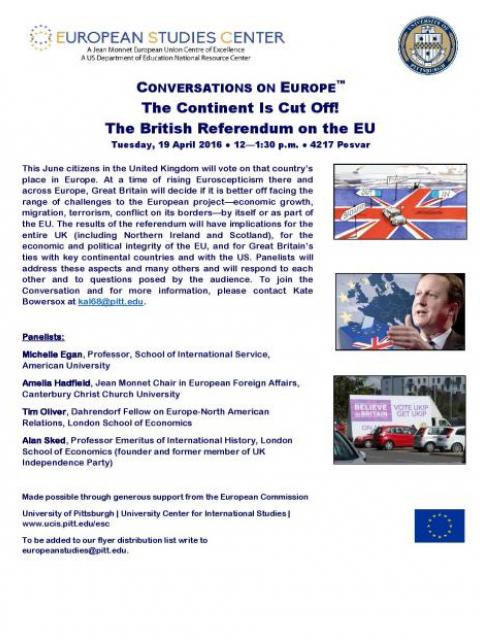
This June citizens in the United Kingdom will vote on that country’s place in Europe. At a time of rising Euroscepticism there and across Europe, Great Britain will decide if it is better off facing the range of challenges to the European project—economic growth, migration, terrorism, conflict on its borders—by itself or as part of the EU. The results of the referendum will have implications for the entire UK (including Northern Ireland and Scotland), for the economic and political integrity of the EU, and for Great Britain’s ties with key continental countries and with the US. Panelists will address these aspects and many others and will respond to each other and to questions posed by the audience. To join the Conversation and for more information, please contact Kate Bowersox at kal68@pitt.edu.
Panelists:
Michelle Egan, Professor, School of International Service, American University
Amelia Hadfield, Jean Monnet Chair in European Foreign Affairs, Canterbury Christ Church University
Tim Oliver, Dahrendorf Fellow on Europe-North American Relations, London School of Economics
Alan Sked, Professor Emeritus of International History, London School of Economics (founder and former member of UK Independence Party)
Thursday, April 14th, 2016
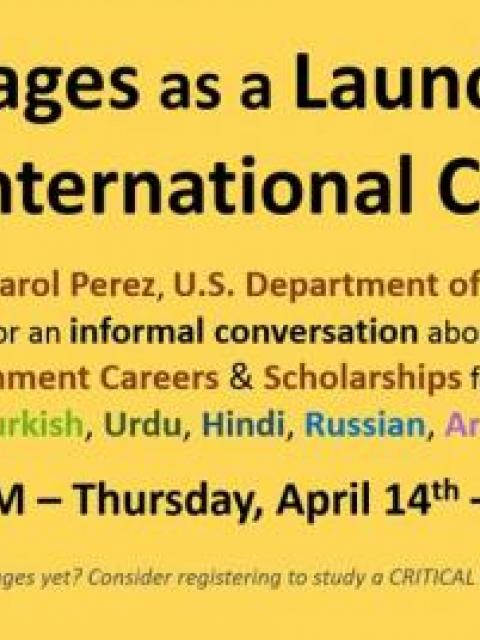
Carol Perez, a high-level State Department official, will visit Pittsburgh to promote the many ways Americans can conduct foreign policy and serve their country abroad. Students of Less-Commonly-Taught Languages are uniquely qualified for a career with the State Department, as they have already demonstrated their ability to adapt to other cultures and communicate with people from different backgrounds. Also, there is a high demand in the U.S. Government for speakers of Persian, Swahili, Turkish, Urdu, Hindi, Russian, Arabic, Mandarin, and other difficult or less well known languages. If you would like to hear more about how to embark on a career with the State Department or secure a Critical Language Scholarship, please join Carol Perez and her State Department colleagues on April 14 for an informal conversation.
Tuesday, April 12th, 2016

“Safe Harbor” is gone, replaced by a new US-EU Privacy Shield agreement. What does this means for US businesses and protection of personal data? Find out from this Virtual Briefing by logging in from your home or office at noon on Tuesday, April 12, 2016.
Presenters:
Ted Dean, US Department of Commerce, Chief Negotiator of US-EU Privacy Shield
Pierluigi Perri, University of Milan, Specialist in Advance Computer Law
David Thaw, University of Pittsburgh, Specialist in Law and Information
For information on how to connect and to register: http://tinyurl.com/gllxtrr.
Cost: $15
Saturday, April 9th, 2016

The University Center for International Studies will host a Teacher Forum on Internationalizing the K-12 Classroom on Saturday, April 9, 2016 at the William Pitt Union on the University of Pittsburgh’s Oakland campus.
The forum will provide educators, either as an individual participant or as a team of two, with the opportunity to present a project or lesson with a regional or global focus that they have used in the classroom. The project or lesson should focus on one or more of the following items: build understanding and awareness of other cultures, analyze multiple perspectives, communicate effectively across diverse groups, or take action on an international or global issue. Teams consisting of an in-service and a pre-service teacher are particularly encouraged to attend.
Educators will participate in a carousel poster presentation competition in the morning session. During this time educators will have the opportunity to learn from one another’s lessons, while also engaging in a judged competition. Each team will be allowed two to three minutes to present their lesson to a set of judges.
Following the morning presentations, educators will participate in a number of workshops that focus on internationalizing the K-12 classroom led by University of Pittsburgh faculty as well as highly qualified teachers from the region.
At the end of the day, all participants will gather together for the awards ceremony. One winner will be selected from each division – elementary, middle, and high school. Each winner will be awarded $500.00.
Thursday, April 7th, 2016
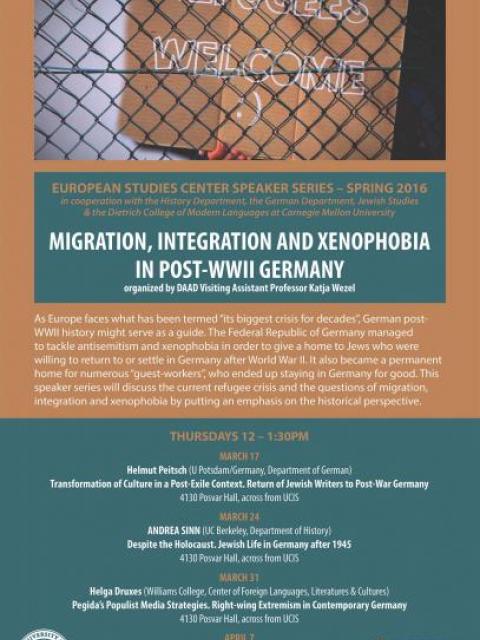
This lecture aims to offer a broader and more nuanced perspective on what has been widely referred to as Europe’s “refugee crisis.” With a focus on Germany, the lecture will reflect on the national and international events and changes that occurred between 2011 and the present as a means of rethinking this crisis as both a humanitarian crisis and an example of humanitarianism in crisis.
Wednesday, April 6th, 2016
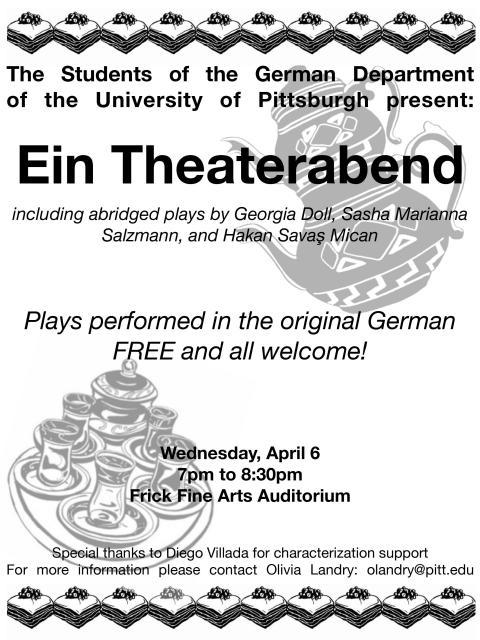
Plays performed in the original German and all welcome!
In this presentation both upstream (hydrocarbon exploration and production) and downstream (pipelines, refining centers, economics and policy) energy information relevant to Russia will be presented. 2015 has been an interesting year and will be reviewed in some detail. For Russia 2016 will be the year of the DUC wells (drilled but uncompleted) with continued price recovery in oil, but weak prices, oversupply and intense competition in the gas liquids and natural gas resource areas.
Tuesday, April 5th, 2016
Russia and Hungary have developed very different economies and political systems in the process of postcommunist transition. Nevertheless, a certain convergence takes place in recent years. Vladimir Putin's regime in Russia and Viktor Orban's regime in Hungary combine authoritarianism, national populism, neoliberal reforms and certain economic measures that go beyond neoliberalism. One way to understand this convergence is to study two distinct types of capitalism that emerged in Russia and in Hungary, their contradictions and the role of the state. Ultimately, the authoritarian consolidation in both countries is rooted in the state-class relations. Both regimes have taken steps that go beyond the neoliberal playbook and adopted the policy of economic nationalism. Nevertheless, in both countries this policy is combined with neoliberal reforms in the social sphere. The presentation examines the past, the present and the future of both regimes.
Friday, April 1st, 2016
The Europe: East and West Undergraduate Research Symposium is an annual event designed to provide undergraduate students, from the University of Pittsburgh and other colleges and universities, with advanced research experiences and opportunities to develop presentation skills. The event is open to undergraduates from all majors and institutions who have written a research paper from a social science, humanities, or business perspective focusing on the study of Eastern, Western, or Central Europe, the European Union, Russia, or other countries of the former Soviet Union. Selected participants give 10- to 15-minute presentations based on their research to panels of faculty and graduate students. The presentations are open to the public.
Friday, April 1st, 2016 to Saturday, April 16th, 2016
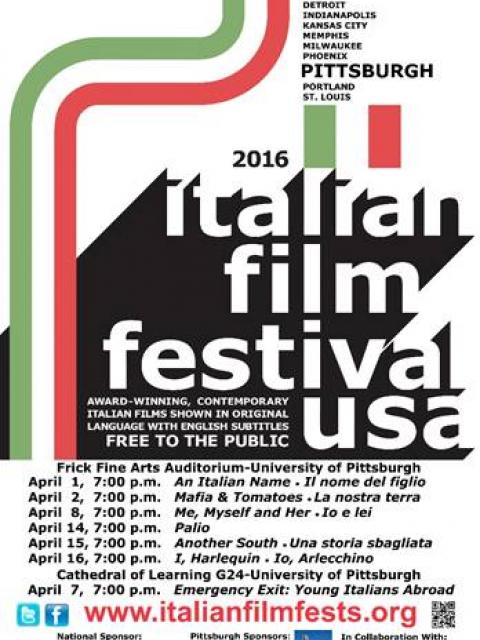
In collaboration with the St. Louis non-profit “Italian Film Festival USA,” we are pleased to announce the fourth edition of our three-week-long festival of contemporary, Pittsburgh-premiere Italian films; our festival begins next week, on Friday, April 1 with Francesca Archibugi’s Il nome del figlio. This year, all screenings will be on Pitt’s Oakland campus: the April 2, 8, 14, 15, and 16 screenings will be held at the Frick Fine Arts auditorium, while the April 7 screening will be held in the Cathedral of Learning, in G-24. All screenings will take place at 7pm, and are free and open to the public. The full schedule, with links to film synopses and a printable PDF flyer, is available here: www.italianfilmfests.org/pittsburgh.
Thursday, March 31st, 2016
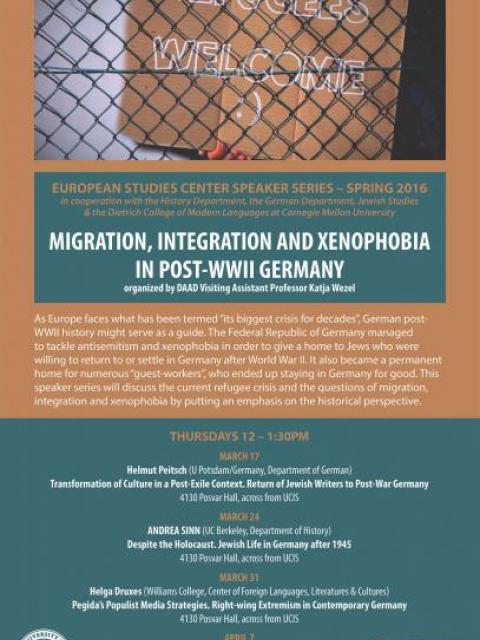
When PEGIDA began its weekly protest marches in October 2014, many were blindsided by its steady outpouring of support. From a mere 350 followers on October 25, 2014, the numbers grew to between 17,000 and 25,000 on January 12, 2015. This talk analyzes the rhetoric and ideological affinities of PEGIDA with other right populist groups, both past and present. Their biases rely on chauvinistic nationalism and anti-government and anti-journalist stances. Slogans like “lying press” and “government abuse” create disdain for democratic mechanisms and open the door to violence and conspiracy theories. A close look at PEGIDA’s and AfD’s ideological backers (Udo Ulfkotte, Götz Kubitschek, and Tanja Festerling) reveals the group’s violent actionism despite its claim to represent mainstream citizens. Employing Jacques de St. Victor’s concept of anti-politics, Professor Druxes analyzes how PEGIDA instrumentalizes mistrust in governmental institutions to create a digital simulacrum of political participation.
Wednesday, March 30th, 2016
The advent of historical biblical criticism in the late eighteenth century created a seismic shift that seemed to release the Hebrew Bible from its subservience to Christian doctrine. For Goethe and other German writers of this era, the Hebrew Bible began to emerge with striking, new contours, inviting heterodox explorations that had been previously unthinkable, and serving as a surprising source for their very modern fictional worlds.
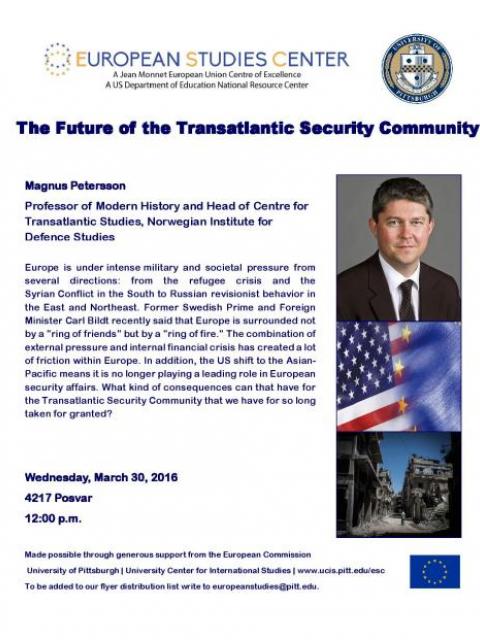
Europe is under intense military and societal pressure from several directions: from the refugee crisis and the Syrian Conflict in the South to Russian revisionist behavior in the East and Northeast. Former Swedish Prime and Foreign Minister Carl Bildt recently said that Europe is surrounded not by a "ring of friends" but by a "ring of fire." The combination of external pressure and internal financial crisis has created a lot of friction within Europe. In addition, the US shift to the Asian-Pacific means it is no longer playing a leading role in European security affairs. What kind of consequences can that have for the Transatlantic Security Community that we have for so long taken for granted?
Thursday, March 24th, 2016
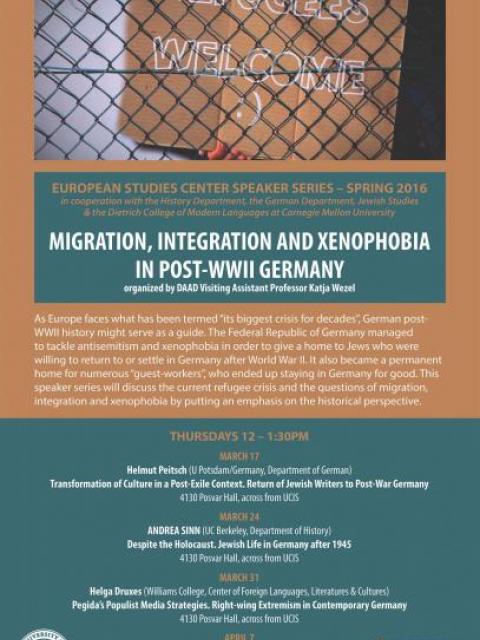
This lecture discusses the various forms of isolation and stigmatization experienced by Jewish communities in Germany in the postwar period and seeks to explore the process of redefining Jewish existence in “the land of the perpetrators.” Competing and conflicting German, Jewish, and international conceptions of Jewish life in Germany that were voiced during the early postwar years play an important role in understanding the process of development within individual Jewish communities in the Federal Republic and the position that German-Jewish organizations occupy within the German as well as the Jewish environment today.
Wednesday, March 23rd, 2016

For the European Studies Center's second installment of Conversations on Teaching Europe, we will connect experts and local K-12 teachers via videoconference to discuss strategies and techniques that infuse information about European cultures, people and history as well as contemporary issues into curricula. For this particular webinar, we will discuss the use of European art and architecture in classroom lessons with a faculty expert and two local K-12 teachers.
Tuesday, March 22nd, 2016
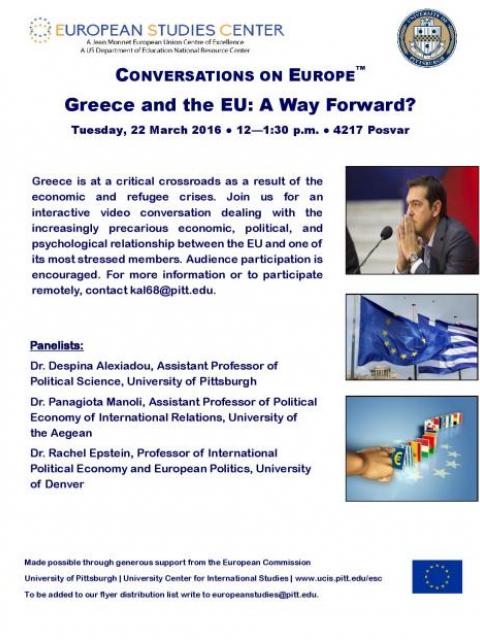
Greece is at a critical crossroads as a result of the economic and refugee crises. Join us for an interactive video conversation dealing with the increasingly precarious economic, political, and psychological relationship between the EU and one of its most stressed members. Audience participation is encouraged. For more information or to participate remotely, contact kal68@pitt.edu.
Panelists:
Dr. Despina Alexiadou, Assistant Professor of Political Science, University of Pittsburgh
Dr. Panagiota Manoli, Assistant Professor of Political Economy of International Relations, University of the Aegean
Dr. Rachel Epstein, Professor of International Political Economy and European Politics, University of Denver
Monday, March 21st, 2016
Dr. Ferree uses a discursive approach to explore the paradoxes of how gender equality politics intersects with liberal as well as neoliberal reform projects in universities. The ongoing struggles over meaning of higher education provide the context in which the global dynamics of academic capitalism and global modernization create different challenges and opportunities for gender equality advocates in Germany and the US. She specifically examines the discourses of diversity management and gender mainstreaming as frames for accountability and excellence in these and other universities.
Thursday, March 10th, 2016
The Euro Challenge is a national competition for 9th and 10th grade high school students to test their knowledge and understanding of the European economy and the euro, the currency shared by many of the 28 European Union member nations. Teams of up to five students take on the role of international policymakers to explore real world economic issues and possible solutions and recommendations to those issues.
Students who win the regional competition at the University of Pittsburgh have the opportunity to advance to the national competition in New York City where the tops teams are awarded cash prizes.
Saturday, March 5th, 2016
This Institute offers area secondary school French teachers an opportunity to maintain or improve their language skills, to develop deeper understanding of French culture and its global influence, and to share relevant teaching strategies. The French Immersion Institute hosts three Saturday workshops through the year and an intensive, weeklong workshop beginning in the summer of 2016.
Thursday, March 3rd, 2016
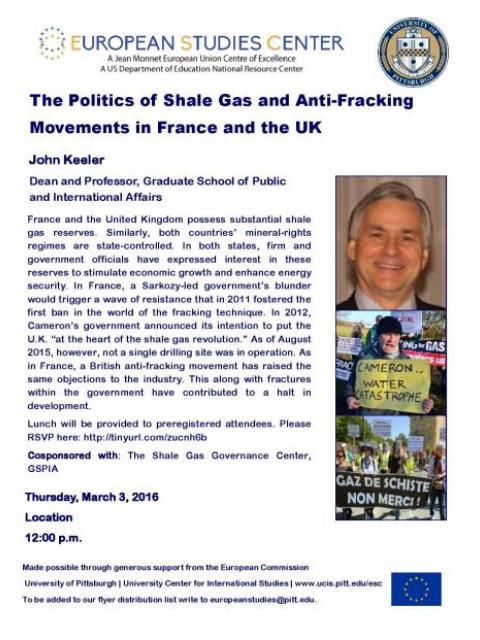
France and the United Kingdom possess substantial shale gas reserves. Similarly, both countries’ mineral-rights regimes are state-controlled. In both states, firm and government officials have expressed interest in these reserves to stimulate economic growth and enhance energy security. In France, a Sarkozy-led government’s blunder would trigger a wave of resistance that in 2011 fostered the first ban in the world of the fracking technique. In 2012, Cameron’s government announced its intention to put the U.K. “at the heart of the shale gas revolution.” As of August 2015, however, not a single drilling site was in operation. As in France, a British anti-fracking movement has raised the same objections to the industry. This along with fractures within the government have contributed to a halt in development. Dr. Ilia Murtazashvili, Assistant Professor in the Graduate School of Public and International Affairs, will offer remarks in response to Dr. Keeler's presentation.
Lunch will be provided to preregistered attendees. Please RSVP here by March 1st: http://tinyurl.com/zucnh6b
Cosponsored with: The Shale Gas Governance Center, GSPIA
Friday, February 26th, 2016 to Saturday, February 27th, 2016
The undergraduate Model European Union is an annual event that gives students a chance to learn about the workings of the European Union through preparation for and participation in a hands-on two day simulation. Model EU enhances students’ understanding of the issues and challenges facing the 28 member nations of the EU. Awards are given to the most effective delegations and best individual position papers.
This year's competition will host universities from across Pennsylvania, Ohio, and Illinois and will take place at the University of Pittsburgh-Greensburg campus.
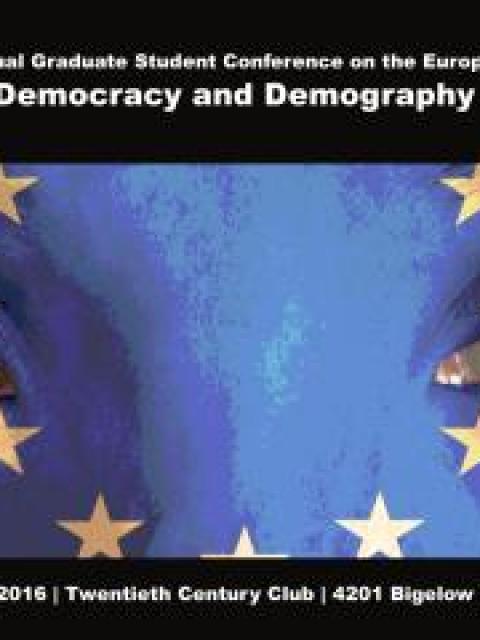
The world is watching as a determined Europe strives to remain united and bridge the democratic deficit. Eurosceptic parties and secessionist referenda are gaining ground within and amongst the member states. As refugee talks become mired in discussion on infrastructure and resources, there lies a deep disagreement on European identity. Is this the same debate that member states have been having for years? Or is this the beginning of a new set of challenges? The Organizing Committee of the Eleventh Annual Graduate Student Conference on the European Union welcomes submissions from all disciplines and topics including, but not limited to, EU politics, governance, economics, history, security studies, institutions and behavior studies, as well as policy, enlargement, immigration, development, trade, and foreign policy. Papers addressing the theme of the conference will receive special consideration. View the program at http://www.ucis.pitt.edu/esc/node/49.
The keynote address will be given by Dr. Mai'a Cross, Assistant Professor from Northeastern University in Boston, Massachusetts.
Friday, February 26th, 2016
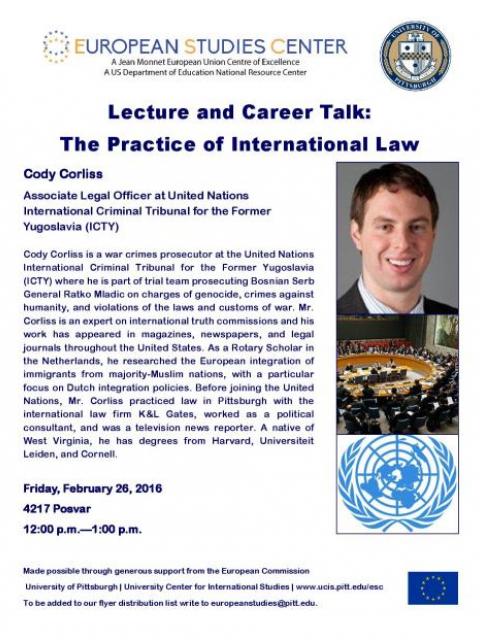
Cody Corliss is a war crimes prosecutor at the United Nations International Criminal Tribunal for the Former Yugoslavia (ICTY) where he is part of trial team prosecuting Bosnian Serb General Ratko Mladic on charges of genocide, crimes against humanity, and violations of the laws and customs of war. Mr. Corliss is an expert on international truth commissions and his work has appeared in magazines, newspapers, and legal journals throughout the United States. As a Rotary Scholar in the Netherlands, he researched the European integration of immigrants from majority-Muslim nations, with a particular focus on Dutch integration policies. Before joining the United Nations, Mr. Corliss practiced law in Pittsburgh with the international law firm K&L Gates, worked as a political consultant, and was a television news reporter. A native of West Virginia, he has degrees from Harvard, Universiteit Leiden, and Cornell.
NOTE: Room Change!
Friday, February 19th, 2016
Can politicians use political tools to prevent volatility in the financial markets? The political economy literature shows that international financial actors watch political developments closely and can respond negatively to certain political events, such as the election of left-wing governments. However, these events are the outcomes of a (sometimes unpredictable) democratic process and beyond the control of political elites. We take a novel approach to this question and explore how political actors can directly mitigate the negative financial market effects based on their selection of ministers and portfolio allocation. We argue that international investors closely monitor political appointments, and are fast to reward governments that appoint (non-partisan) technocrats, especially when these governments lack credibility in the international markets. We expect that technocratic appointments act as signals to investors that a competent and market-friendly environment exists. With an event study analysis that employs new data on the professional and political background of finance ministers in 21 Western and Eastern European parliamentary democracies, we test the effects of ministerial appointments on the market returns. Our findings shed light to a so-far unexplored effect of international financial markets on domestic and partisan politics.
Tuesday, February 16th, 2016
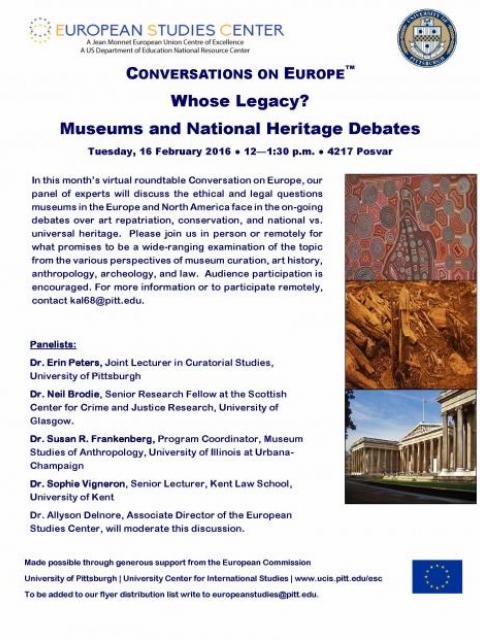
In this month’s virtual roundtable Conversation on Europe, our panel of experts will discuss the ethical and legal questions museums in the Europe and North America face in the on-going debates over art repatriation, conservation, and national vs. universal heritage. Please join us in person or remotely for what promises to be a wide-ranging examination of the topic from the various perspectives of museum curation, art history, anthropology, archeology, and law. Audience participation is encouraged. For more information or to participate remotely, contact kal68@pitt.edu.
Panelists:
Dr. Erin Peters, Joint Lecturer in Curatorial Studies, University of Pittsburgh
Dr. Neil Brodie, Senior Research Fellow at the Scottish Center for Crime and Justice Research, University of Glasgow.
Dr. Susan R. Frankenberg, Program Coordinator, Museum Studies of Anthropology, University of Illinois at Urbana-Champaign
Dr. Sophie Vigneron, Senior Lecturer, Kent Law School, University of Kent
Dr. Allyson Delnore, Associate Director of the European Studies Center, will moderate this discussion.
Friday, February 12th, 2016
The second in a series of annual UCIS professional development workshops organized for faculty and staff of community colleges in the Western Pennsylvania region with the aim of internationalizing these community college campuses. Presenters from the University of Pittsburgh and Carnegie Mellon University will discuss admissions, orientation, academics and student life in relation to international students attending US colleges.
Thursday, February 11th, 2016
As a follow-up to research undertaken as a part of EU-GLOBAL, an EU-funded International Researcher and Staff Exchange Scheme (IRSES) Grant Pitt received along with four partners in the U.S. and Europe, Dr. Bernard Goldstein, Professor Emeritus and former Dean of the Graduate School of Public Health, will present his work on the method of shale gas extraction known as “fracking”.
Dr. Goldstein will present a manuscript summarizing studies performed while a visiting professor at the University of Cologne Department of Political Science and European Affairs. While initially focusing on the role of property rights in the differing rate of shale gas development, he found evidence of increasing and broadening concern among the US conservatives, but not the EU right wing, that environmental sustainability and related issues are an attack on US property rights, and that this emerging difference is likely to further heighten EU/US disparities on environmental issues. He will also present preliminary evidence that there are EU/US differences in the formation and role of boundary organizations, such as the Center for Sustainable Shale Development.
The paper is now available for download here: http://tinyurl.com/jlc89qm. Dr. John Keeler, Dean of the Graduate School of Public and International Affairs, will offer remarks and moderate the question and answer session.
Lunch will be available for pre-registered attendees. Please register by noon February 10, 2016 at: http://tinyurl.com/z5bznaw.
Wednesday, February 3rd, 2016
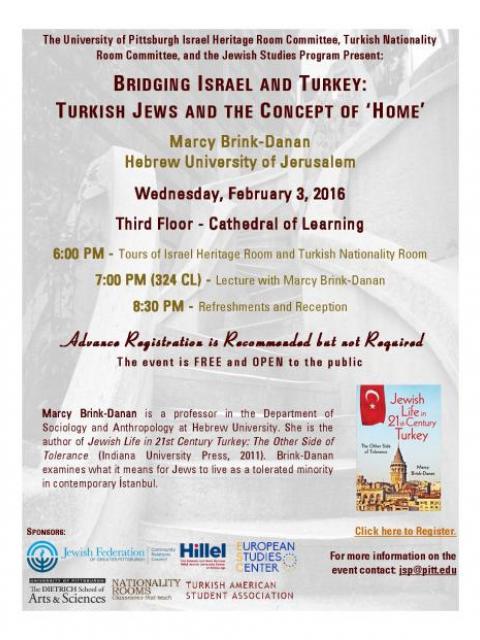
Marcy Brink-Danan is a professor in the Department of Sociology and Anthropology at Hebrew University. She is the author of Jewish Life in 21st Century Turkey: The Other Side of Tolerance (Indiana University Press, 2011). Brink-Danan examines what it means for Jews to live as a tolerated minority in contemporary İstanbul. The overall schedule for the event is listed below:
6:00 PM - Tours of Israel Heritage Room and Turkish Nationality Room
7:00 PM (324 CL) - Lecture with Marcy Brink-Danan
8:30 PM - Refreshments and Reception
Advance Registration is Recommended but not Required
The event is FREE and OPEN to the public
Tuesday, February 2nd, 2016
Jurcek Zmauc is the President of the Slovenian American Business Association and is a Secretary of the Office for Slovenes Abroad of the Republic of Slovenia. A native of Maribor, Slovenia, he received degrees in law from the University of Maribor and from the University of Ljubljana. His career has included service as the Republic of Slovenia’s Counsel General in Austria and as its Counsel General in Cleveland, Ohio, and as the Deputy Minister and Director of the Division of Southeast Europe of the Ministry of Foreign Affairs of Slovenia. In ad-dition to his government service, Mr. Zmauc has taught civil and international business law at the University of Maribor, and has served as Director of its Center for International Cooperation.
Monday, January 25th, 2016
Claire Goldstein is Associate Professor in the Department of French & Italian at the University of California Davis. Her book, Vaux & Versailles: The Appropriations, Erasures and Accidents that Made Modern France, appeared in 2008 with the University of Pennsylvania Press. She is currently at work on a book manuscript entitled Comets in the Sun King’s Cosmos. Circulation and Epistemology in Early Modern France. This project examines how the last comets before Halley’s organize curiosity, scrutiny, resistance, and doubt regarding the epistemological status of observation, and crystalize alternative (non-official, sometimes contestatory) networks in which information and texts circulate.
Monday, January 25th, 2016 to Wednesday, March 30th, 2016
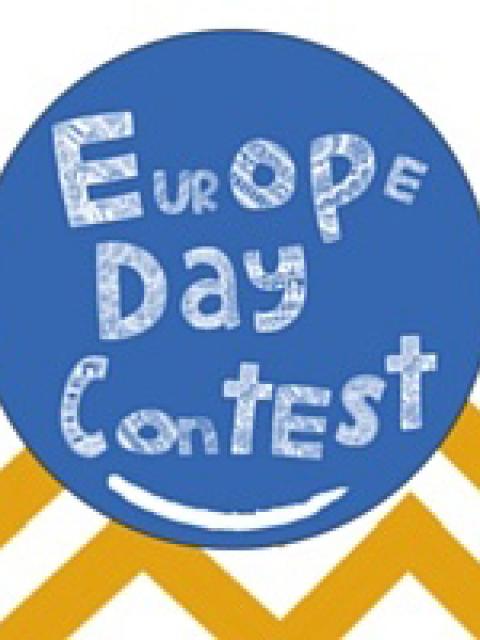
The European Studies Center's Europe Day Contest is a multimedia contest for students in grades K-12. Students participating in the Europe Day Contest can submit projects using different forms of media related to each year's theme as an individual participant or as a member of a group of two to four students based on the type of project. Selected student winners will be awarded prizes and the opportunity to display their work at the first annual Europe Day Festival on Saturday, May 7, 2016 on the University of Pittsburgh campus.
For more information please visit the European Studies Center's Europe Day Contest website or contact Kathy Ayers, Outreach Coordinator.
Friday, January 22nd, 2016
No more than with the famous passage from Pindar, Pythian 8.95 (alluded to in the two questions in this lecture's title) can the Iliad be definitively and simply explicated. Picking up, however, from Melanippedes, another fifth century BCE lyric poet, this presentation investigates the idea that, as Scholion on Il 13.350 which cites Melanippedes says, "Thetis was pregnant by Zeus when she was given in marriage to Peleus because of the remarks of Prometheus or Themis."
Any such scenario is kept under wraps in the Iliad, but it nevertheless pervades the whole poem, starting with its first word. Watkins' now well-known observation that mênis is used in archaic Greek epic poetry only of divinities (15 times) and of Achilles (4 times) becomes simpler if we view Achilles as being even more divine than one regularly imagines.
Superficially, the reference to Achilles as "son of Peleus," within line 1 itself, might seem to undercut any putative divine resonance in mênin; however, a comparably complex pattern is paralleled elsewhere in the Iliad, as for example at 16. 173-178, where Menesthios is referred to actually the son of the river-god Spercheios though in name (epiklesin) he was the son of Boros, who married his mother Polydora.
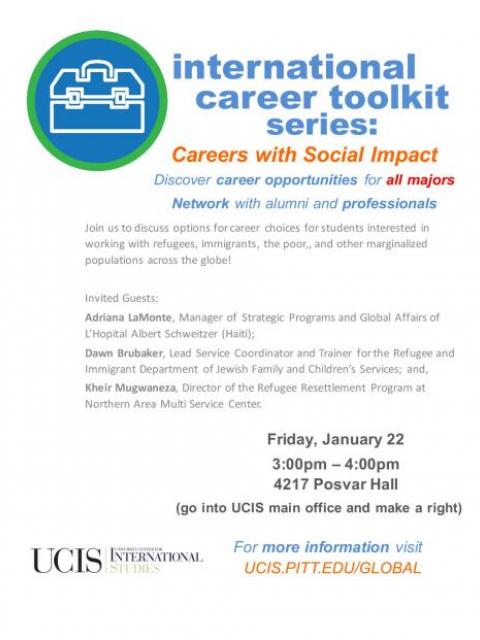
International Career Toolkit Series: Careers with Social Impact
Presenters: Adriana LaMonte, Manager of Strategic Programs and Global Affairs of L’Hopital Albert Schweitzer (Haiti); Dawn Brubaker, Lead Service Coordinator and Trainer for the Refugee and Immigrant Department of Jewish Family and Children’s Services; Kheir Mugwaneza, Director of the Refugee Resettlement Program at Northern Area Multi Service Center.
In the fifth installment of our International Career Toolkit Series, we will discuss careers with social impact in the U.S. and abroad. Our three guests will discuss options for career choices for students interested in working with refugees, immigrants, the poor, and other marginalized populations across the globe.
Join us to learn how to embark on careers in social impact!
Tuesday, January 19th, 2016
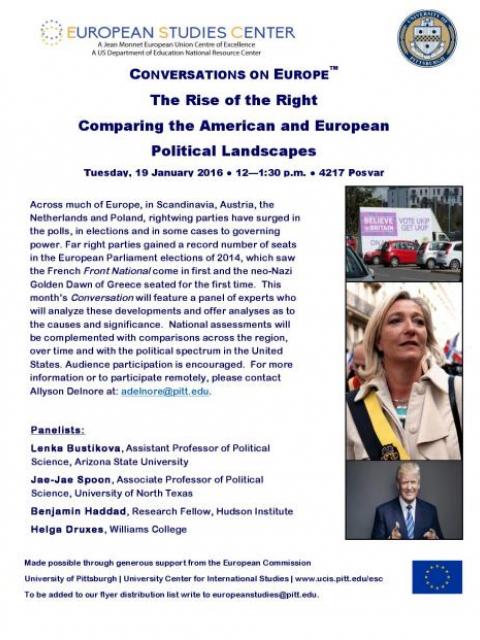
This month’s session of our Conversation on Europe series will be devoted to the recent social movements and electoral dynamics within both the U.S. and Europe that reflect a rise in populist and right wing movements. Polarizing figures like Donald Trump and Marine Le Pen have grabbed headlines on both sides of the Atlantic, attracted enthusiastic crowds at public rallies, and prompted a great deal of liberal hand-wringing in social media forums. How electorally significant are these individuals and movements? What accounts for their rise in popularity? Our panel of experts will debate these issues and others.
Panelists include:
Lenka Bustikova, Assistant Professor of Political Science, Arizona State University
Jae-Jae Spoon, Associate Professor of Political Science, University of North Texas
Benjamin Haddad, Research Fellow, Hudson Institute
Helga Druxes, Proferssor of German, Williams College
Audience participation is welcome. For more information or to participate remotely, contact adelnore@pitt.edu.
Saturday, January 16th, 2016
KQV Interview
Thursday, January 14th, 2016
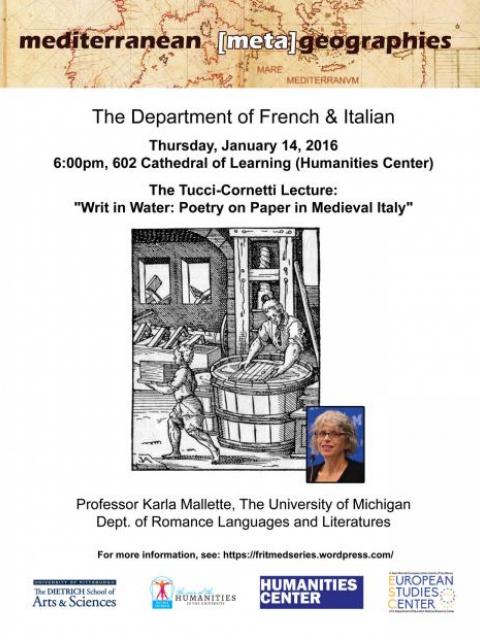
On Thursday, January 14, 2016, Professor Mallette will deliver the Italian Program’s annual Tucci-Cornetti Lecture at 6pm in 602 CL (Humanities Center) .
“Writ in Water: Poetry on Paper in Medieval Italy”
The technology of papermaking took off in Italy following the fourth crusade, at the beginning of the thirteenth century. By the fourteenth century, Italian paper was abundant and cheap, and Italian papermakers soon dominated the paper industry across the Mediterranean, displacing parchment as writing material. This talk studies the impact that Italian paper had on the writers who used it – historians, storytellers, and especially poets – in late medieval Italy. How did great authors like Dante and Petrarch respond to the new technology? “Writ in Water” describes writers’ reactions to the introduction of the new medium, and how it transformed the writer’s craft.
Friday, December 11th, 2015

The UN Climate Change Conference (COP 21 / CMP 11) taking place in Paris November 30-December 11, 2015 seeks to achieve a legally binding and universal agreement on climate, with the aim of keeping global warming below 2⁰C. This will not be an easy goal to reach, as many scientists say the gases we have already emitted into the atmosphere will inevitably lead to a 2 degree increase. Expectations are high on all sides – with optimists and pessimists alike touting this as our last chance to avert catastrophe. This month’s session of our Conversations on Europe series of virtual roundtables will assemble a panel of experts to provide their views of what was accomplished and what was lost in the negotiations. Are the dire prognostications reasonable? And what are the next steps? Audience participation is encouraged. For more information or to participate remotely, contact adelnore@pitt.edu.
Audience participation is encouraged. For more information or to participate remotely, contact adelnore@pitt.edu.
Panelists Include:
Michaël Aklin, Assistant Professor, Political Science
Wil Burns, Co-Executive Director, Forum for Climate Engineering Assessment, American University
Thomas Pellerin-Carlin, Research Fellow, European Energy Policy, Jacques Delors Institute
Leah Stokes, Assistant Professor, Political Science, University of California, Santa Barbara
Friday, December 4th, 2015
ALL MAJORS WELCOME!
In the fourth installment of our International Career Toolkit Series, we will discuss teaching English abroad and how to prepare for it. Teaching English abroad in public schools, private, schools, universities, and private companies is a great way to immerse yourself in different cultures while gaining valuable experience that will make you stand out when applying to graduate school or jobs. You do not need to be an English or Education major to teach English abroad! Our panelists include invited guests: Pitt alum and current graduate student Crystal Christophe who taught English in South Korea and Oman; Lee Ann Bryan of the Greater Pittsburgh Literacy Council who taught English at a private school in Slovakia, and in Pittsburgh through Literacy AmeriCorps; Pitt student Michelle Grant who taught English in Spain; and others! Come hear their stories and get ready to teach abroad!
Thursday, December 3rd, 2015
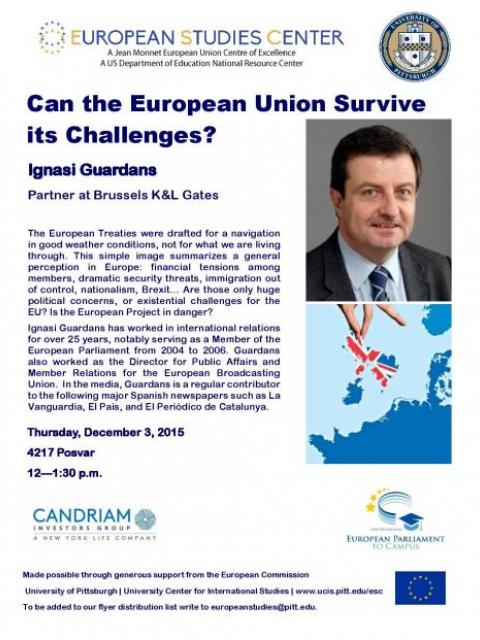
The European Treaties were drafted for a navigation in good weather conditions, not for what we are living through. This simple image summarizes a general perception in Europe: financial tensions among members, dramatic security threats, immigration out of control, nationalism, Brexit... Are those only huge political concerns, or existential challenges for the EU? Is the European Project in danger?
Ignasi Guardans has worked in international relations for over 25 years, notably serving as a Member of the European Parliament from 2004 to 2006. Guardans also worked as the Director for Public Affairs and Member Relations for the European Broadcasting Union. In the media, Guardans is a regular contributor to the following major Spanish newspapers such as La Vanguardia, El País, and El Periódico de Catalunya.
Wednesday, December 2nd, 2015
Please join K&L Gates and co-sponsors, the Dick Thornburgh Forum for Law and Public Policy, the University of Pittsburgh European Studies Center, and the German American Chambers of Commerce as former European Parliament member and current Brussels K&L Gates partner, Ignasi Guardans discusses the state of U.S. and EU economic and commercial ties. The likely impact of the pending Transatlantic Trade and Investment Partnership (T-TIP) negotiations on economic growth, trade and consumer privacy also will be addressed. More than thirteen million jobs currently are supported by transatlantic trade and investment and the future possibilities are significant but rapidly changing.
Welfare systems are going through a process of major change. These changes risk undermining the very nature of and philosophy behind the welfare systems of all developed countries. Every country has developed a specific social security system linked to its economic system. Recent important changes have reopened the debate about the classification of welfare regimes and researchers have explored the differences between the philosophies undergirding policies throughout Europe. In most of the European countries, policy-making has followed autonomous and independent paths. These processes have produced heterogeneous regional welfare systems, relative to the policies (health, social security, elderly, etc.) and to the territories specific to that region. In Italy, a cross-sectional analysis of regional systems shows that there is differentiation in governance models not only between regions, but also at the regional level. The presentation will focus on the relative reform proposed by the Italian Parliament in October 2015 and its potential implications on economic and social policies more broadly.
The high school Model European Union is an annual event that gives students a chance to learn about the workings of the European Union through preparation for and participation in a hands-on daylong simulation. Playing the roles of presidents and prime ministers, students spend a day engaged in intense negotiations over conflicting issues about the EU. Model EU enhances students’ understanding of the issues and challenges facing the 28 member nations of the EU. Awards are given to the most effective delegations and best individual position papers.
Friday, November 20th, 2015
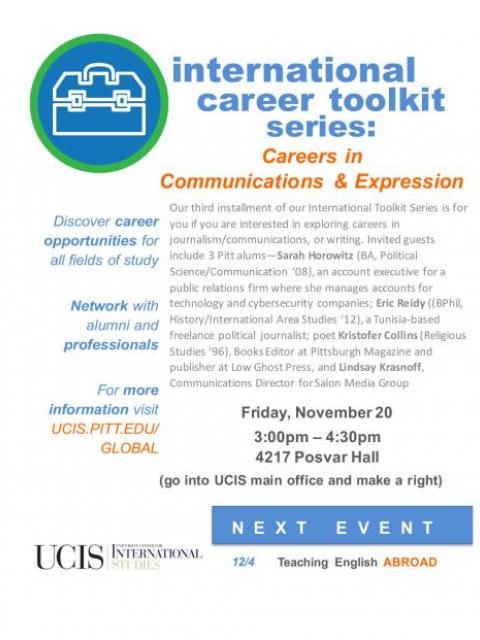
Our third installment of our International Toolkit Series is for you if you are interested in exploring careers in journalism/communications, or writing. Invited guests include 3 Pitt alums—Sarah Horowitz (BA, Political Science/Communication ‘08), an account executive for a public relations firm where she manages accounts for technology and cybersecurity companies; Eric Reidy ((BPhil, History/International Area Studies ‘12), a Tunisia-based freelance political journalist; poet Kristofer Collins (Religious Studies ‘96), Books Editor at Pittsburgh Magazine and publisher at Low Ghost Press, and Lindsay Krasnoff, Communications Director for Salon Media Group.
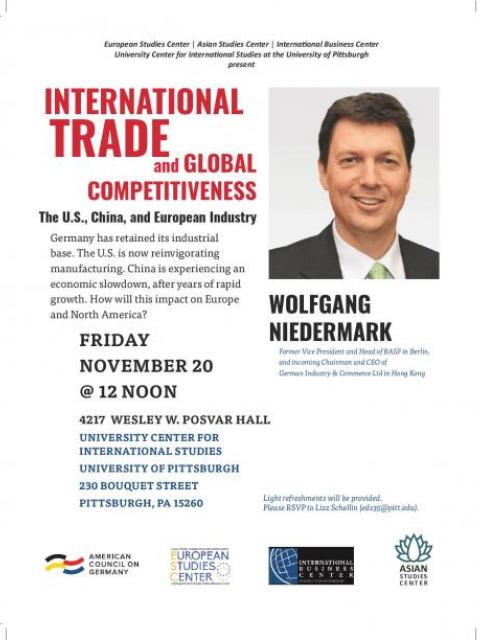
Germany has retained its industrial base. The U.S. is now reinvigorating manufacturing. China is experiencing an economic slowdown, after years of rapid growth. Herr Nidermark will discuss how this will impact Europe and North America. Light refreshments will be provided. Please RSVP to Lizz Schellin (eds35@pitt.edu).
Wednesday, November 18th, 2015
University of Pittsburgh Chancellor Patrick Gallagher, administrators and staff from Pitt’s European Studies Center and University Center for International Studies, as well as students, staff, and faculty from Pitt, Duquesne University, Carnegie Mellon University, and Carlow University assembled Wednesday, Nov. 18, to show support for the victims of the Paris terrorist attacks and the people of France.
Tuesday, November 17th, 2015
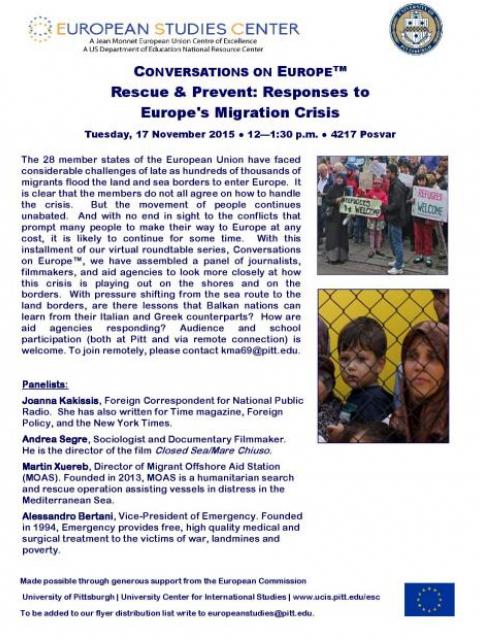
The 28 member states of the European Union have faced considerable challenges of late as hundreds of thousands of migrants flood the land and sea borders to enter Europe. It is clear that the members do not all agree on how to handle the crisis. But the movement of people continues unabated. And with no end in sight to the conflicts that prompt many people to make their way to Europe at any cost, it is likely to continue for some time. With this installment of our virtual roundtable series, Conversations on Europe, we have assembled a panel of journalists, filmmakers, and aid agencies to look more closely at how this crisis is playing out on the shores and on the borders. With pressure shifting from the sea route to the land borders, are there lessons that Balkan nations can learn from their Italian and Greek counterparts? How are aid agencies responding?
Panelists include:
Joanna Kakissis, Foreign Correspondent for National Public Radio. She has also written for Time magazine, Foreign Policy, and the New York Times.
Andrea Segre, Sociologist and Documentary Filmmaker. He is the director of the film Closed Sea/Mare Chiuso.
Martin Xuereb, Director of Migrant Offshore Aid Station (MOAS). Founded in 2013, MOAS is a humanitarian search and rescue operation assisting vessels in distress in the Mediterranean Sea.
Center Director Ron Linden will moderate. Audience and school participation (both at Pitt and via remote connection) is welcome. To join remotely, please contact kma69@pitt.edu.
Monday, November 16th, 2015 to Friday, November 20th, 2015
International Education Week is celebrated at Pitt and campuses across the country for one week, from November 17-21, 2014. The week is an opportunity for you to experience a new culture, open your mind to a new perspective of the world, or to simply savor a new taste. In short, this is the one week of the year that is jam-packed with activities to open your senses to the world.
Check out the activities planned for each day of the week at www.internationalweek.pitt.edu
Friday, November 13th, 2015
During this session Professor Zito will be available to discuss the range of opportunities available to Pitt people and institutions under the EU’s Erasmus+ program for student and faculty mobility to Newcastle and Great Britain. He will also discuss the recently signed exchange agreement between Pitt and Newcastle University.
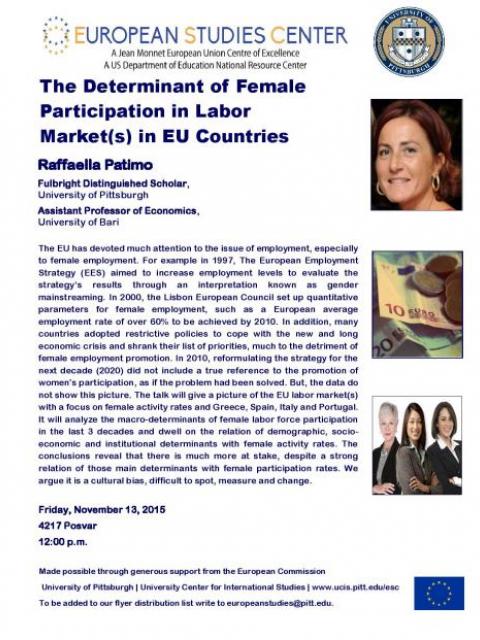
The EU has devoted much attention to the issue of employment, especially to female employment. For example in 1997, The European Employment Strategy (EES) aimed to increase employment levels to evaluate the strategy’s results through an interpretation known as gender mainstreaming. In 2000, the Lisbon European Council set up quantitative parameters for female employment, such as a European average employment rate of over 60% to be achieved by 2010. In addition, many countries adopted restrictive policies to cope with the new and long economic crisis and shrank their list of priorities, much to the detriment of female employment promotion. In 2010, reformulating the strategy for the next decade (2020) did not include a true reference to the promotion of women's participation, as if the problem had been solved. But, the data do not show this picture. The talk will give a picture of the EU labor market(s) with a focus on female activity rates and Greece, Spain, Italy and Portugal. It will analyze the macro-determinants of female labor force participation in the last 3 decades and dwell on the relation of demographic, socio-economic and institutional determinants with female activity rates. The conclusions reveal that there is much more at stake, despite a strong relation of those main determinants with female participation rates. We argue it is a cultural bias, difficult to spot, measure and change.
Friday, November 6th, 2015
Please join us for a special day just for world language teachers, ESL teachers, social studies teachers, and administrators.
Highlights include the following:
-FREE curricular and instructional materials for teachers from the University of Pittsburgh's International Outreach Coordinators
-International enrichment programs for students here in Pittsburgh
-Information on the new Global Scholars Program from PSMLA
-Opportunities for international service-learning trips
-Exploration of a global citizenship curriculum
Schedule for the Day:
8:00 AM Registration and Breakfast
9:00 AM Welcome & Keynote Address
9:45 AM Session I
10:45 AM Session II
11:45 AM Session III
12:30 PM Catered Lunch & Table Talks
1:30 PM Debriefing & Next Steps
2:00 PM Wrap Up
Please mail completed registration form and a $50 check made payable to Fox Chapel Area School District by Monday, November 2, 2015.
Fox Chapel Area High School
611 Field Club Road
Pittsburgh, PA 15238
(412) 967-2430
Thursday, November 5th, 2015
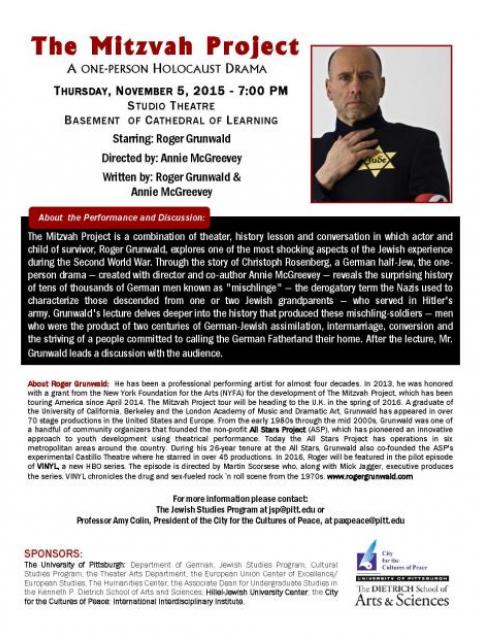
The Mitzvah Project is a combination of theater, history lesson and conversation in which actor and child of survivor, Roger Grunwald, explores one of the most shocking aspects of the Jewish experience during the Second World War. Through the story of Christoph Rosenberg, a German half-Jew, the one-person drama — created with director and co-author Annie McGreevey — reveals the surprising history of tens of thousands of German men known as "mischlinge" — the derogatory term the Nazis used to characterize those descended from one or two Jewish grandparents — who served in Hitler's army. Grunwald's lecture delves deeper into the history that produced these mischling-soldiers — men who were the product of two centuries of German-Jewish assimilation, intermarriage, conversion and the striving of a people committed to calling the German Fatherland their home. After the lecture, Mr. Grunwald leads a discussion with the audience.
Drawing on data from two qualitative studies on masculinity and domestic violence in Sweden, this lecture will address the relation between space, affect, and violence.
Come join us for an informal discussion about current issues related to European Union politics. In this first session, Dr. Despina Alexiadou of the Department of Political Science will moderate and offer a perspective on the Greek debt and the European response. Light refreshments will be provided.
Monday, November 2nd, 2015
Friday, October 30th, 2015
French and Italian Languages and Literatures is celebrating its 50th anniversary during calendar year 2015. As important figures in the department’s past, present, and future, they invite you to join the celebration!
Join the Department at the 50th anniversary social reception in the University Club Ballroom to reconnect with classmates and faculty. RSVP to frit50@pitt.edu by September 30, 2015, with your name, graduation year, and current address.
Thursday, October 29th, 2015 to Friday, October 30th, 2015
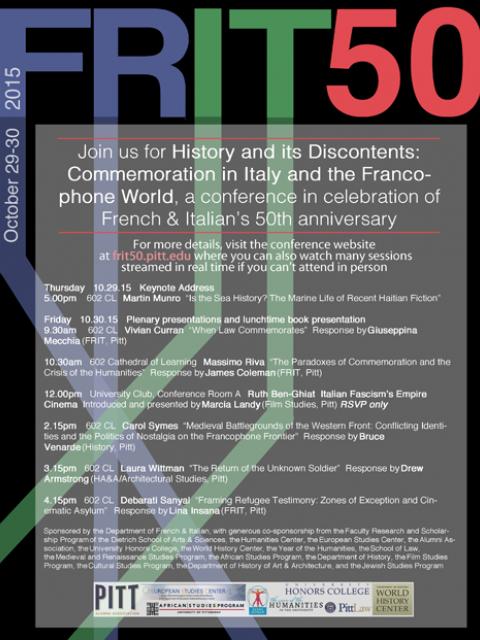
The Department of French & Italian Languages and Literatures will hold a conference on Thursday, October 29 and Friday, October 30, 2015: “History and its Discontents: Commemoration in Italy and the Francophone World.” On this occasion we will welcome an exciting slate of visitors to campus to reflect on the dates, places, discourses, and mechanisms of commemoration in the French, Francophone, and Italian cultures; distinguished scholars from a range of institutions and specializing in a stimulating array of topics and periods will be joined in conversation by our Pitt faculty colleagues in French & Italian and beyond.
Martin Munro (Florida State University, French) will deliver the keynote address, with Vivian Curran (Pitt, School of Law), Massimo Riva (Brown, Italian Studies), Debarati Sanyal (Berkeley, French), Carol Symes (Illinois at Urbana-Champaign, French/History/Theater), and Laura Wittman (Stanford, French & Italian) presenting their work in plenary sessions. Finally, Ruth Ben-Ghiat (NYU, Italian/History) has agreed to present her new book Fascist Italy’s Empire Cinema in a special session. We hope through this conference to make visible the importance of humanistic inquiry in our understanding, commemoration, and narrativization of the natural and historical events that shape our world.
This event is also sponsored by the European Union Center of Excellence, the Department of French and Italian, and a grant from the Dietrich School Faculty Research and Scholarship Program. For more information contact Renate Blumenfeld-Kosinski at renatebk80@gmail.com.
Date:
Thursday, October 29, 2015 - 5:00pm to Friday, October 30, 2015 - 6:00pm
Saturday, October 24th, 2015
Qu’est ce qui a fait rire Jean Louis Dassier et Myriam Gau depuis qu’ils sont petits? Venez découvrir le rire en France vue par ces deux animateurs dynamiques.
French Immersion Institutes are designed for French instructors as well as advanced level college students to broaden their cultural understanding of current events and international studies regarding French-speaking countries, to strengthen their French listening and speaking skills, and to share strategies for the teaching of French language and culture. ACT 48 credit is available. Lunch and a continental breakfast will be served. Advanced registration is required.
Friday, October 23rd, 2015
The Roman god of war plays a subtle and important role in the narrative of Virgil's Aeneid. Through the course of his epic, Virgil employs the father of Romulus and the Roman people as a key divine figure in his unfolding of the death of the old Troy and the advent of Rome. Through the course of his epic, Virgil employs the father of Romulus and the Roman people as a key divine figure in his unfolding of the death of the old Troy and the advent of Rome.
Dr. Fratantuono specializes in Latin poetry, imperial Greek verse and Roman history. Among his numerous publications are his recent books Madness Transformed: A Reading of Ovid's Matamorphoses (2011); Madness Triumphant: A Reading of Lucan's Pharsalis (2012); and A Reading of Lucretius's De Rerum Natura (2015).
All are welcome to attend!
In the 1990's, European Institutions progressively got involved in some urban renewal projects linked to deprived neighborhoods of European cities. But they also since then seem to have given up their ambition to set up a proper urban community policy. Although European programs dedicated to cities remain far from representing the most important of European policies, we'll show that the interventions of European institutions in that realm have had different impacts on renewal policies in Europe.
RSVP: SWPA@pitt.edu or on line at http://ucsur.pitt.edu/events/brown-bag-seminar/aisling-healy-ph-d/
Thursday, October 22nd, 2015
Ancient armies traveled with wine transported in amphorae. The remains of these amphorae can often shed light on processes and impacts of military provisioning as well as on the narrative and impacts of particular battles and wars. For example, the Roman general Manlius Vulso rapaciously crisscrossed Anatolia in the early 2nd BC ending up at Gordion. A large number of amphorae have been found at that site just a the period of his arrival. These, most likely, indicate both the source and path of his supply lines. Studyo f the amphorae found at sites related to events of this and other wars shed light on both the narrative of conflict itself and the war's aftermath.
Mark Lawall is a Professor in the Department of Classics at the University of Manitoba. His interests include Greek Archaeology, Ancient Economic History, Transport Amphoras, Maritime Archaeology, Athens, Ephesos, Gordion, and Troy.
This lecture is free and open to the public.
Two-thirds of European inhabitants live in a city. Europe’s cities are the political, economic, and cultural core of European life and activity. As a result, urban public policies are shaped not only by local but also heavily by national and European decisions. As cities are not directly represented in Brussels in a dedicated assembly, they have been claiming to be recognized as major actors of the European decision-making process since the end of the 1980’s. This lecture will focus on the way local authorities, notably municipalities, have progressively accessed Brussels’ arena, and in return on the effects of community urban programs on local political agendas.
This presentation will be an opportunity to question how and to what extent European institutions have taken into account the will of most European cities to become admitted central actors not only regarding urban matters but also economic matters, sustainable development matters, if not immigration matters… Have the European institutions agreed on meeting with cities and their representatives? Has the lobbying of cities been successful in terms of them becoming major interlocutors of the European Union on any topic related to urban issues? Has a community policy dedicated to cities been launched and implemented? If yes, is it linked to regional policies or has it gained autonomy? Audience discussion will be encouraged.
Tuesday, October 20th, 2015
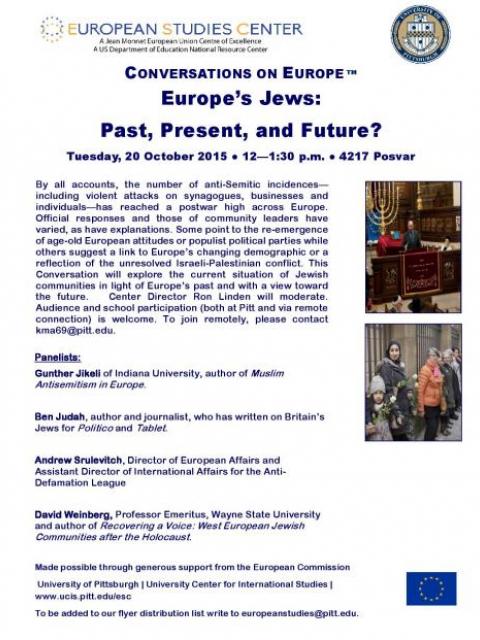
By all accounts, the number of anti-Semitic incidences—including violent attacks on synagogues, businesses and individuals—has reached a postwar high across Europe. Official responses and those of community leaders have varied, as have explanations. Some point to the re-emergence of age-old European attitudes or populist political parties while others suggest a link to Europe’s changing demographic or a reflection of the unresolved Israeli-Palestinian conflict. This Conversation will explore the current situation of Jewish communities in light of Europe’s past and with a view toward the future. Center Director Ron Linden will moderate.
Panelists include: Gunther Jikeli of Indiana University, author of Muslim Antisemitism in Europe; Ben Judah, author and journalist, who has written on Britain’s Jews for Politico and Tablet; Andrew Srulevitch, Director of European Affairs and Assistant Director of International Affairs for the Anti-Defamation League; and David Weinberg, Professor Emeritus, Wayne State University and author of Recovering a Voice: West European Jewish Communities after the Holocaust.
Audience and school participation (both at Pitt and via remote connection) is welcome. To join remotely, please contact kma69@pitt.edu.